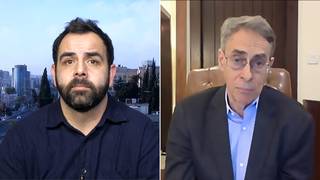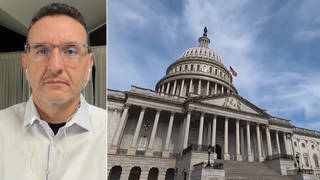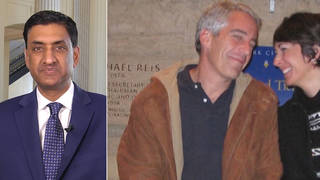
Guests
- Gina Plata-Ninointerim director for SNAP at the Food Research and Action Center.
More than 1.4 million federal employees missed their first full paychecks on Friday as the government shutdown enters its fifth week. Meanwhile, the Department of Agriculture warns that food aid to 42 million people could be cut off starting November 1, as the Trump administration refuses to use a $5 billion contingency fund to maintain SNAP, the Supplemental Nutrition Assistance Program, popularly known as food stamps.
Gina Plata-Nino from the Food Research and Action Center says the loss of SNAP benefits will have cascading impacts as credit card debt soars, rent payments are delayed and food banks get overrun. “We are going to see a decrease in people’s well-being,” says Plata-Nino.
Transcript
AMY GOODMAN: This is Democracy Now!, democracynow.org. I’m Amy Goodman, with Juan González.
The U.S. federal government shutdown has entered its 28th day. On Friday, more than a million — 1.4 million — federal workers missed their first full paychecks.
This is furloughed federal worker Anthony Spade in line at a food bank in Washington, D.C.
ANTHONY SPADE: So, today is my — normally, I would get paid today. I don’t have no paycheck in my account. I still have bills that are due. I have a family that I have to take care of. So, it’s a lot of uncertainty that comes along with this. I’m grateful for these opportunities to receive assistance, but there is a lot of uncertainty that comes along with it, and it causes a lot of stress, as well.
AMY GOODMAN: Now the American Federation of Government Employees, the nation’s top federal workers’ union, is calling on Congress to immediately end the shutdown by passing a bill without agreeing to demands from Democrats to extend healthcare subsidies from the Affordable Care Act that are set to expire Saturday, November 1st, doubling premiums for some 20 million people.
As many of federal workers turn to food pantries, the Department of Agriculture says it will cut off food aid to some 42 million people who rely on SNAP — that’s Supplemental Nutrition Assistance Program — starting Saturday. President Trump says he will not tap into a contingency fund of $5 billion to keep SNAP running.
This is Jill Dixon, executive director of the Food Depot, a food bank in northern New Mexico.
JILL DIXON: For every meal that a food bank provides, the SNAP program provides nine. … There’s no way we can replace every single one of those meals. … It is not sustainable for food banks to fill this gap. We were not built to do this.
AMY GOODMAN: On Monday, Senator Bernie Sanders posted on social media, quote, “Trump is throwing 15 million Americans off health care. He’s doubling premiums for 20 million Americans. Now, he’s refusing to use a $5 billion emergency SNAP fund to keep 16 million kids from going hungry. But the 1% keep $1 trillion in tax breaks. Oligarchy in action,” Sanders said.
We’ll look more at healthcare in a minute. We begin in Washington, D.C., with Gina Plata-Nino, interim director for SNAP at the Food Research and Action Center, FRAC.
Thanks so much for being with us, Gina. Lay out what’s happening. What is at stake this week?
GINA PLATA-NINO: The at stake, it is the livelihood. It is food on the table for over 42 million of Americans who are going to lose their faith in government if the secretary of agriculture doesn’t utilize these contingency reserves that she has in place, that she has been given the authority to utilize, to ensure that SNAP benefits in November are not delayed.
JUAN GONZÁLEZ: And, Gina, the Department of Agriculture, with Trump’s appointee, Brooke Rollins, put out a quite amazing statement on their website. They have in a notice to the public, quote, “Bottom line, the well has run dry. At this time, there will be no benefits issued November 01. We are approaching an inflection point for Senate Democrats. They can continue to hold out for healthcare for illegal aliens and gender mutilation procedures or reopen the government so mothers, babies, and the most vulnerable among us can receive critical nutrition assistance.” Have you ever seen such a — such a statement by a government agency?
GINA PLATA-NINO: No, and everything’s incorrect. I mean, we can go down the line and breaking down every point and to just say, you know, everything’s a lie. You know, we can throw out data, so much data, in terms of who benefits from SNAP. Ninety-six percent are U.S. citizens. Majority of people who utilize SNAP are white Americans. The people who benefit from this program are Americans.
But really, what it comes down to is, unfortunately, made individuals who utilize this so that they can pay for rent because they don’t have enough money. Majority of people who are in SNAP are working. They live paycheck to paycheck, and this will offset them, while SNAP is supposed to be a supplemental program. And reality is it’s their whole food budget. And when you have to make a decision between making sure that there’s food on the table for your child — while they may be getting food at school, when they come home, they’re going to see mommy and daddy skipping meals. So, it’s just, unfortunately, that they’re utilizing human beings, Americans, as a political battle, as chess pieces, when they have to — they’re going to have to face their landlord and say, “I don’t have money for food. I don’t know if I can pay my rent.”
So, we’re going to see. And we’re starting to see a higher utilization of credit card debt for those who still have credit cards. We’re going to see, you know, more people going into the food banks. But the food banks do not have the resources, and they can’t make up what SNAP does, nine meals for every one that a food bank does. So, we are going to see a decrease in people’s well-being, unnecessary mental health and pressure, similarly to what we saw in the previous shutdown under the first Trump administration.
But even then, the secretary appointed was able to ensure that benefits went out earlier so we wouldn’t be in the situation where we are now, which is why Congress gave the authority to the secretary, through contingency funds, that they could utilize them. And they have been utilizing them to pay administrative expenses for the states. So, they just have to tap into those resources and any additional reserves. For example, in Section 32, that they utilize to fund WIC, the secretary can and should utilize this authority and not play with people’s lives, their likelihood, with their food, particularly when everything’s more expensive.
JUAN GONZÁLEZ: And how are some states responding to this looming cutback?
GINA PLATA-NINO: Remember that SNAP is a federal program. The state handles all of the federal money. So, this idea that, like, there are buckets of money sort of laying around, it’s not correct. And states already have been trying to figure out how to come back from the reconciliation bill signed by Trump, by President Trump, in the summer, in July, because they were already trying to figure out how they were going to continue paying for SNAP, because for the first time in history, SNAP has to become a line item budget if people want to continue putting this in the program, because the reconciliation law takes away $187 billion from SNAP. So, this is a continuation in terms of what the administration finds. So, states were already dealing with this, saying, “How are we going to implement all of these changes? How are we going to do this with less administrative resources? How are we going to put money up front?”
And now the shutdown is happening, and people are very — you know, justifiably, very angry and just upset, and don’t understand that the person that can make all of this go away is the secretary, is the president, by just the secretary utilizing her power. And some states are saying, “Should we utilize funding?” They can’t do it. They don’t have the resources. There are not additional reserves. And USDA sent out two memos on Friday. One of them said that states will not get reimbursed if they utilize this. So, we know that Virginia’s governor called it a state of emergency, and they’re figuring out how to do this. We’ve heard from other states, as well. The governor of California gave more money to food banks and mobilized the National Guard to help carry the food and make sure that they process the food. But this is a Band-Aid on a bigger issue, and it just shows the impact that the federal inaction is causing.
AMY GOODMAN: So, finally, Gina Plata-Nino, the children. How many children in the U.S. rely on SNAP? And what’s going to happen now?
GINA PLATA-NINO: The majority of people on SNAP are children, followed by older adults and followed by people with disabilities.
You know, what’s going to happen now is that these kids are going to school. Thankfully, there’s child nutrition programs. They’re going to get their breakfast. They’re going to get their get their lunch. But then they’re going to go home. And people forget that children don’t live by themselves, right? They have a caretaker. That caretaker is already incredibly stressed out about how they’re going to pay their bill and have food on the table.
You know, the children are going to say, you know, “Mommy, Daddy, why don’t we have a Thanksgiving meal? Why don’t we have enough food at the table? Why aren’t you eating? Why do you look so stressed?” And this is unnecessary burden on children to have to deal with everything else that’s going on in their environment. So, we’re going to see an increase of mental health issues and a lower well-being for many individuals.
AMY GOODMAN: And your final comment on the fact that the $1 trillion tax cut for billionaires remains in place as children go hungry?
GINA PLATA-NINO: Yes, and that’s what people don’t understand, that this debt ceiling issue, that what happened in July, was a policy choice, right? It was to extend these tax credits to incredibly wealthy individuals. It’s not working-class Americans. It’s not middle-class Americans. It is the wealthiest of wealthiest, because as all of us are struggling to pay for food that is more expensive, 3% more expensive — three times more expensive than it was last year, billionaires are spending more money. There are various stories and research and studies to show that have more money to spend, because this is what the tax break did. While the individuals who are working hard, because majority of people on SNAP are working, getting paid less than $1,000, these same corporations that got large tax breaks are not paying people livable wages, and so they have to rely on SNAP. And now they’re not — they may not be able to pay for food. They may not be able to pay for rent, because they need to be able to eat.
AMY GOODMAN: Gina Plata-Nino, we want to thank you for being with us, interim director for SNAP at the Food Research and Action Center, a nonprofit working to end hunger in America.













Media Options